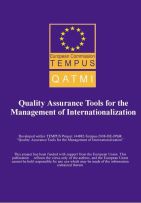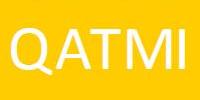
Quality Assurance Tools for the Management of Internationalization
A project coordinated by Carl von Ossietzky Universität Oldenburg, Germany.
QATMI BOOKLET AVAILABLE ONLINE!
|
TEMPUS QATMI Final Conference
|
QATMI (Quality Assurance Tools for the Management of Internationalization) is a project funded by the European Commission in the framework of the TEMPUS program.
The duration of this project is three years (January 15th 2009 - January 14th 2012) and its main aim is to disseminate good practices in benchmarking analysis applied to university international relations in order to identify areas for change, and assists in setting targets for improvement.
Overcoming the consequences of long-lasting isolation in the sphere of higher education is one of the most important elements in the whole set of problems faced by the post-Soviet countries since the collapse of USSR. Due to a closed, self-oriented character of the Soviet educational system, with the Ministry of Education acting as a sole provider and guarantor of QA, HEI institutions of the former USSR experienced a certain lack of competitiveness caused by non-transparent QA standards. Along with the system of planned recruitment and assignment that bore almost no connection to the exact demands of the labour market, this lack of competitiveness resulted in a heavy centralization of HE systems in the post-Soviet countries, deepening the gap between central and provincial HEI and creating a nutrient medium for corruption in the sphere of higher education.
The process of internationalization is one of the most efficient means for overcoming the above-listed drawbacks, since it helps to design an integrated, open, extravert educational system closely reflecting the needs and demands of globalized labour market and thus basing upon the principles of competitiveness and self-regulation. Internationalization promotes equal possibilities both for central and provincial institutions, bringing the necessary balance to HE systems and significantly decreases corruption in the sphere of education due to the transparency of QA standards.
Since the collapse of Soviet Union, the former Soviet countries have already made significant steps towards the internationalization of their educational systems. In many of them, numerous institutional agreements have been signed, including those regulating academic mobility along with mutual acknowledgement of academic documents, titles and degrees. Various measures have been taken in all the countries of CA region to promote Bologna principles, including the formation of pilot groups of HEI to implement three-cycled educational system and ECTS. Considerable efforts have been made by some institutions to establish internationally-accredited QA systems both in the frames of Tempus projects and individually.
It should be noted, though, that there is a certain tendency in the politics provided by relevant authorities of post-Soviet area to consider internationalization not as a means but as an aim in itself. Such approach leads to a mere mechanical borrowing of practices and tools applied in European educational systems without securing their functional load and measuring it with existing capacities of regional HEI. The inefficiency of such borrowing calls forth mostly theoretical and declarative character of educational reforms currently carried on in the Post-Soviet region.
At present, under regulatory and legislative uncertainty, relations between local Ministries of Education and HEIs of the post-Soviet countries are characterized by direct management: direct orders regulating all aspects of HEIs activities including management of all resources; direct control over academic progress; centralized issuance of diplomas; a highly bureaucratized license issuance procedure, a non-transparent mechanism for determining students’ enrolment etc.
Taking into consideration the above-listed circumstances, the QATMI project team has concentrated its efforts upon exploring the existing internationalization strategies in the HEI of 5 Post-Soviet countries (Armenia, Azerbaijan, Belarus, Russia, Ukraine) and improving them with regard to their real capabilities. Such approach is supposed to result in a considerable raise of the international profile of the institutions involved, improving the image of post-Soviet area as a progressive educational region worldwide.
With that aim in view, a series of site-visits has been made to the PCI in order to define the existing level of their internationalization according to the benchmark questionnaire reflecting the most important markers of internationalization process in the HEI. The results of this survey, presented below, would help to define the main obstacles in the field under consideration and therefore to elaborate common effective approach towards successful internationalization of post-Soviet higher educational system.
What is internationalization?
In general, Internationalization has been viewed as a process of increasing involvement of enterprises in international markets, although there is no agreed definition of internationalization or international entrepreneurship. Speaking about educational sphere, internationalization has sometimes been defined as the process of integrating an international dimension into the teaching/training, research, and service functions of a university or college or technical institute. Others discuss it as the process of integrating international education into the curriculum, and this is central to organizational change as pervasive for the entire institution, not marginal in nature. Seeing it as an ongoing, dynamic process dominates the literature more than equating it to an event in time. Association of International Education Administrators conference planners defined internationalization as "the incorporation of international contents, materials, activities, and understanding in the teaching, research, and public service functions of universities to enhance the relevance in an interdependent world" (Washington State University, l990, 2).
Creating an international ethos in the university is commonly equated as integral both for the curriculum and for the personnel involved (including faculty, students, and staff).
It could be stated that the idea of internationalization results in a concept of university with an international commitment striving to internationalize its own course offerings, where an obvious institution-wide positive attitude toward understanding better other cultures and societies is present.
European scholars describe internationalization as "the complex of processes whose combined effect, whether planned or not, enhances the international dimension of the experience of higher education in universities" (de Wit, l995, p. 28). Three key questions about the internationalization have been distinguished by Dutch international educators Bremer & van der Wende (l995): how internationalized curricula can be characterized; which factors contribute to the successful development, implementation, and institutionalization of internationalized curricula; and what the outcomes and effects are for internationalized curricula.
Some European writers stated that the concept of internationalization has clearly widened to include not only curriculum and student mobility but also faculty and staff mobility and specific institutional strategies. Others advocate systemic international infusion by weaving international perspectives into every discipline, every major and minor requirement, faculty hiring decision, and mission statement for colleges. Some authors’ views on internationalization include increasing the numbers of programs and opportunities for studying international affairs and infusing the entire curriculum with international perspectives.
To sum it up, internationalization is the process of integrating an international perspective into a college or university system. It is an ongoing, future-oriented, interdisciplinary, leadership-driven vision that involves top administrators creating an institutional vision and motivating people in both academic affairs and student affairs units to change an entire system to think globally, comparatively, and collaboratively while reacting to multi-dimensional environmental changes in global political, economic, social, and cultural arenas. It is the way an institution adapts to an ever-changing, diverse external environment that is becoming more globally-focused.
Why is internationalization important to discuss at all?
Internationalization improves, enhances, and benefits higher education institutions.
It has become the challenge for higher education leaders today because of the political, social, economic, and cultural mega-changes that are occurring outside the walls of academia and affecting (and possibly changing) internal priorities. One needs to unpack all the internal variables for curricular and system-wide internationalization to understand how each fits in with the current interests and priorities of the external environment.
First, separating the different strands of internationalization is essential for clearly perceiving the evidence of internationalization. (The strands include internationalizing curriculum, study abroad participation, faculty overseas research/teaching projects, contributions of international students/scholars on the campus, leadership-driven visions, missions, and goals, as well as other components).
Second, discovering how these strands are currently operating, struggling, or thriving within colleges is the next important step. This could be accomplished by separating the internal issues (e.g., university mission, leadership commitment, programs, personnel, finance, others) and then studying how these relate to and align with the external dimensions (e.g., corporate community’s perceptions and trends and opportunities in the global marketplace).
Third, once these first two steps are completed, leaders can then position the internal and external issues along with the strands of internationalization on a scale, or a model, to plot their commitment to internationalizing higher education and determine each college’s future intervention strategies.
Internationalization is what separates a UNIVERS-ity from other institutional types; it is why the former are sometimes called "world-class" learning institutions which are globally-focused, not regionally or nationally or monoculturally-framed.
What is the rationale for internationalization?
There are ten main reasons for internationalization discovered by modern Canadian scientist Jane Knight in her book "Rationale for Internationalization" (Knight l997, 30):
- Prepare graduates who are internationally-knowledgeable and interculturally-competent;
- Maintain competitiveness;
- Achieve international standards;
- Encourage scholarship on topics regarding interdependence of nations;
- Research national and international issues;
- Export educational services and projects;
- Work for social change;
- Appreciate the ethnic and cultural diversity of one’s nation;
- Generate income for educational institutions;
- Maintain international security and peaceful relations.
What are the key components to an internationalized university?
There are a variety of components or strands that comprise an internationalized campus. These vary in scope, depth of commitment, range and breadth but include:
- the presence of international majors and minors within colleges and professional schools,
- world languages and area studies courses,
- international/comparative courses required for all students regardless of discipline,
- co-curricular international conferences/events/involvement activities on-campus,
- a solid international commitment in campus leadership including the president, vice presidents, provosts, directors, deans, and board of trustees,
- commitment from institutional relations offices including fundraising expertise from university foundation, communication plans by the public relations office, and outreach to international alumni by alumni association,
- international diversity among students, faculty, and scholars and intentional involvement of these stakeholders in internationalizing aspects of campus life,
- international study, work, research programs and internship service opportunities for students (including scholarships),
- international teaching, research, and consulting opportunities for faculty (including travel grants and fellowships),
- partnerships and networks with universities across the globe.
Why is an internationalized curriculum important to students?
Many scholars state the number one reason why faculty should consider internationalizing their courses is that they owe it to their students. Students have much to gain from an internationalized curriculum and an intentionally-diverse campus environment. Students’ interactions with other international students, faculty and scholars contribute to broadening students’ world views during their formative college careers.
Offering a wide variety of international courses, majors, minors, and off-campus study and research abroad programs will be beneficial to students’ knowledge and skills portfolios upon graduation. Educating students with a focus on the "international perspectives" will not only broaden their world views and prepare them for globally-connected career fields, but will prepare them to be citizens of the world, more cognizant of the cultural dimensions affecting their world view and their perception of their own disciplines.
How can we promote and support university-wide internationalization?
Harari (l989) advocates a six-point plan for internationalizing higher education:
- Secure commitment and consensus-building on the part of administrators;
- Analyze the curriculum and the range of international programming including international educational exchanges for both faculty and students;
- Generate responsibility and leadership for international education in a Center for International Education or other structural department with the same functions;
- Provide internal support and external coalitions, partnerships, and funding for international education;
- Create a genuine international ethos on campus which is sustained by the personal human concern of faculty and staff for students of all nationalities and backgrounds;
- Encourage integrated programming/strategic planning for international education (by making it one of the top five priorities for an institution).
Are there any conceptual models for the University’s internationalization?
Of course, there are no universal solutions for the task, but at least five key factors defined by Henson, Noel, Gillard-Byers, and Ingle could be used as a basis for your own conceptual model:
- resources (faculty, administrators, funds, incentives and rewards);
- program activities (international students and scholars; study, work, and internship service opportunities abroad; foreign language study; development cooperation; academic driven programs; research, scholarship, area study programs and graduate education; undergraduate curriculum; and public service);
- leadership and management (commitment; policy; strategic planning and review; allocation of resources);
- organization (structure, linkages, internal culture);
- external environment (global awareness, stakeholder demand, benefits).
Academic mobility refers to students and teachers in higher education moving to another institution inside or outside their own country to study or teach for a limited time.
Mobile students are usually divided into two groups:
Academic mobility suffers from cultural, socio-economical and academic barriers. In order to lower these obstacles within the European higher education area the Bologna process has started.
Bologna process is a procedure aimed at creation of European higher education area by making academic degree standards and quality assurance standards more comparable and compatible throughout Europe, in particular under the Lisbon Recognition Convention. It is named after the place it was proposed, the University of Bologna in the Italian city of Bologna, with the signing in 1999 of the Bologna declaration by Ministers of Education from 29 European countries. Before the signing of the Bologna declaration, the Magna Charta Universitatum and Sorbonne declaration had been signed, both aimed at harmonising the architecture of the European Higher Education system.
European Credit Transfer and Accumulation System (ECTS) is a standard for comparing the study attainment and performance of students of higher education across the European Union and other collaborating European countries. For successfully completed studies, ECTS credits are awarded. One academic year corresponds to 60 ECTS-credits that are equivalent to 1500-1800 hours of study in all countries irrespective of standard or qualification type and is used to facilitate transfer and progression throughout the Union.
The ECTS will be complemented by the European credit transfer system for vocational education and training (ECVET) which the ministers responsible for vocational training in 32 European countries agreed to develop in the Maastricht Communiqué of 14 December 2004.
ECTS also includes a standard grading scale, intended to be shown in addition to local (i.e. national) standard grades:
| Country | Credits in one year | Abbreviation (Unit) |
| European | 60 | ECTS-credits |
| Austria | 60 | ECTS (also ECTS credits) |
| Bosnia and Herzegovina | 60 | ECTS bodova |
| Bulgaria | 60 | кредити |
| Croatia | 60 | ECTS bodova |
| Czech Republic | 60 | kredit |
| Denmark | 60 | ECTS-point |
| England, Wales and Northern Ireland | 120 (60 ECTS) | credits |
| Estonia | 40 (60 ECTS) | ainepunkt (AP) |
| Finland | 60 | opintopiste (op) |
| France | 60 | crédits |
| Hungary | 60 | kredit(pont) |
| Iceland | 30(60 ECTS) | einingar |
| Italy | 60 | crediti formativi universitari (CFU) |
| Latvia | 40 (60 ECTS) | kredītpunkts (KP) |
| Republic of Macedonia | 60 | kredit (ECTS) |
| Malta | 60 | ECTS-credits |
| The Netherlands | 60 | studiepunten (ECTS) |
| Norway | 60 | studiepoeng |
| Poland | 60 | punkt ECTS |
| Portugal | 60 | créditos |
| Romania | 60 | credite |
| Scotland | 120 (60 ECTS) | credits |
| Serbia | 60 | ECTS bodova |
| Slovakia | 60 | kredit |
| Slovenia | 60 | kreditne točke |
| Spain | 72 (60 ECTS) | créditos |
| Sweden | 60 | högskolepoäng (Used from July 2007) |
European Higher Education Area (EHEA) is the objective of the Bologna process - to create more comparable, compatible and coherent systems of higher education in Europe. Under the Lisbon Recognition Convention of the Council of Europe, degrees and study periods are recognised mutually. Article 2 of the first Protocol to the European Convention on Human Rights obliges all signatory parties to guarantee the right to education.
International students are students studying in foreign educational institutions for numerous reasons: either to improve their language skills, or to advance their specialized studies, or because suitable tertiary education is either in short supply or unavailable altogether in their home countries. In addition, in many parts of the world, a foreign degree, especially if earned from certain countries, is honored more than a local one. They are known to move past their cultural differences and learn a new language as well as new cultures. These students provide colleges with an opportunity to learn how to deal with those of diversity.
Internationalization of higher education is the process of integrating an international perspective into a college or university system. It is an ongoing, future-oriented, interdisciplinary, leadership-driven vision that involves top administrators creating an institutional vision and motivating people in both academic affairs and student affairs units to change an entire system to think globally, comparatively, and collaboratively while reacting to multi-dimensional environmental changes in global political, economic, social, and cultural arenas. It is the way an institution adapts to an ever-changing, diverse external environment that is becoming more globally-focused.
Lisbon recognition convention is a document prepared by the Council of Europe together with the members of the Europe Region of UNESCO on recognition of academic qualifications as part of the Bologna process.
Quality assurance, or QA for short, refers to planned and systematic production processes that provide confidence in a product's suitability for its intended purpose. It is a set of activities intended to ensure that products (goods and/or services) satisfy customer requirements in a systematic, reliable fashion. QA cannot absolutely guarantee the production of quality products, unfortunately, but makes this more likely.
Two key principles characterise QA: "fit for purpose" (the product should be suitable for the intended purpose) and "right first time" (mistakes should be eliminated). QA includes regulation of the quality of raw materials, assemblies, products and components; services related to production; and management, production and inspection processes.
It is important to realize also that quality is determined by the intended users, clients or customers, not by society in general: it is not the same as 'expensive' or 'high quality'. Even goods with low prices can be considered quality items if they meet a market need.
QATMI is a TEMPUS project which aims to enhance the capacity of universities to internationalize by installing a professionalised and institutionalized process of internationalization amongst universities.
QATMI brings together 12 universities in the European Union and TEMPUS IV partner countries, reaching out to over 40 university staff members.
QATMI provides opportunities for partner universities to
- provide information and training on different types of internationalization and its demands, taking into consideration, the needs of the global post-soviet changed market necessities;
- provide comparative analysis of international processes in the different participating universities;
- provide guidelines and staff training to establish the appropriate legal background for internationalization;
- establish the necessary infrastructure for effective internationalization, leading to transnational network establishment;
- promote university capacity building in internationalization
| Institution (Web link) | Name | Representatives | Country |
|---|---|---|---|
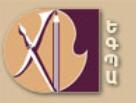 http://www.yafa.am/en/index.htm |
Yerevan State Academy of Fine Arts | Mrs. Susanna Karakhanyan | Armenia |
 http://www.ysu.am/ |
Yerevan State University | Mr. Alexander Markarov | Armenia |
 http://www.bsu-az.org/index_en.html |
Baku Slavic University | Mrs. Sahiba Gafarova | Azerbaijan |
 http://www.bsu.by/ |
Belarusian State University | Mr. Vladimir Tikhonov | Belarus |
 http://www.uni-oldenburg.de/ |
Carl von Ossietzky University Oldenburg | Mrs. Birgit Bruns | Germany |
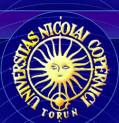 http://www.umk.pl/en/ |
Nicolaus Copernicus University Torun | Mrs. Ewa Derkowska-Rybicka | Poland |
 http://www.bsu.edu.ru/ |
Belgorod State University | Mrs. Inna Kaskova | Russian Federation |
 http://www.volsu.ru/English/NEWS/index.html |
Volgograd State University | Mr. Pavel Timachev | Russian Federation |
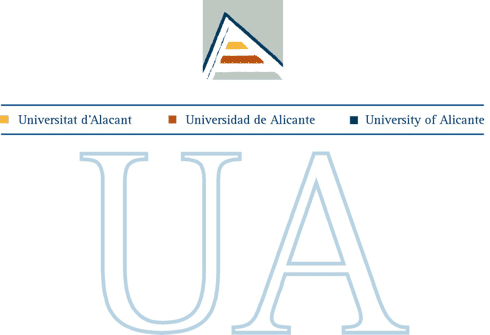 http://www.ua.es/ |
University of Alicante | Mr. Nizar Ayadi | Spain |
 http://www.ru.nl/ |
Radboud University Nijmegen | Mr. Leendert Verhofstad | The Netherlands |
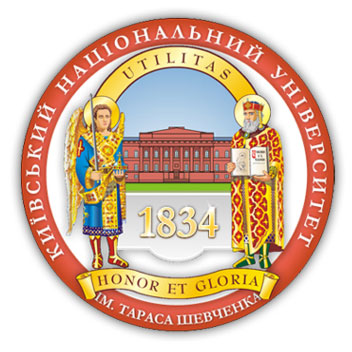 http://www.univ.kiev.ua/ |
Taras Shevchenko National University of Kyiv | Mr. Olexandr Shnyrkov | Ukraine |
 http://www.znu.edu.ua/eng/university |
Zaporizhzhya National University | Mrs. Olena Tupakhina | Ukraine |
QATMI universities actively participate and mutually support capacity building actions in:
- Format and guidelines for self-assessment
- Production of self-assessment survey
- Defining of Good-Practice
- Format and guidelines for benchmark
- Good-Practice Study
- Performance analysis
- Training workshops
- Training materials on enhanced methodologies in internationalization
- Implementation of enhanced methodologies
- Quality control and monitoring
- Management activities
- QATMI booklet: Quality Assurance Tools for the Management of Internationalization
BelSU_SITE-VISIT Presentation.pps
BSlU_Azerbaijan Presentation for final conference.ppt
UA_International Strategic Planning_Marhuenda_QATMI.pptx
VSU_Kyiv Presantation (Timachev).ppt
YSU_Internationalization policy and process at YSU.ppt
ZNU_IMPROVING ACADEMIC MOBILITY MANAGEMENT.ppt
News about international activities of Institute of International Relations (IIR) of Kyiv National Taras Shevchenko University (KNTSU)
Round table “Internationalization as a tool for development and quality improvement of education, research, innovations and international relations of the University”
On December 21, 2010 the round table “Internationalization as a tool for development and quality improvement of education, research, innovations and international relations of the University” took place in the main building of Kyiv National Taras Shevchenko University as an action within implementation of the TEMPUS-QATMI project (Qality Assuarance Tools for Management of Internationalization) 144882-TEMPUS-2008-DE-JPGR.
The participants of the round table included the University staff involved in management of international activities. In particular, the following staff members presented reports: V.Zaslavsky (Head of the Department of International Scientific and Technical Cooperation and. Innovation Technology), Z.Voitenko (Vice-Dean for International Cooperation of the Faculty of Chemistry), I.Baisarovych (Vice-Dean for International Cooperation of the Faculty of Geology), O.Chugaiev (Assistant Professor of Institute of International Relations). About 20 staff members attended the round table.
The following issues were discussed: internationalization experience of other higher educational institutions; obstacles for development of international relations of the University; planned international activities; development of new types of international activities; cooperation with research programs of the EU and other donors; experience of searching, preparing and implementation of international projects; innovation activity and international research development strategy.
21 грудня 2010 р. у головному навчальному корпусі Київського національного університету імені Тараса Шевченка в рамках реалізації проекту TEMPUS-QATMI (Засоби забезпечення якості управління інтернаціоналізацією) 144882-TEMPUS-2008-DE-JPGR відбулося засідання круглого столу «Інтернаціоналізація – шлях розвитку та забезпечення якості освіти, науки, інновацій та міжнародних зв’язків університету».
У круглому столі брали участь співробітники університету в сфері управління міжнародними зв’язками. Зокрема, з доповідями виступили В.А. Заславський (начальник управління міжнародного науково-технічного співробітництва та інноваційних технологій), З.В. Войтенко (заступник декана з міжнародного співробітництва Хімічного факультету), І.М. Байсарович (заступник декана з міжнародного співробітництва Геологічного факультету), О.А. Чугаєв (асистент Інституту міжнародних відносин). На засіданні були присутні близько 20 осіб.
Під час засідання обговорювалися такі питання: досвід вищих навчальних закладів у сфері інтернаціоналізації; проблеми на шляху розвитку міжнародного співробітництва університету; заплановані заходи у сфері розвитку міжнародних зв’язків; розвиток нових напрямів інтернаціоналізації університету; співробітництво з науковими програмами ЄС та інших донорів; досвід пошуку, підготовки та виконання міжнародних проектів; інноваційна діяльність та стратегії розвитку міждисциплінарних наукових досліджень.
21 декабря 2010 г. в главном учебном корпусе Киевского национального университета имени Тараса Шевченко в рамках реализации проекта TEMPUS-QATMI (Способы обеспечения качества управления интернационализацией) 144882-TEMPUS-2008-DE-JPGR состоялось заседание круглого стола «Интернационализация – путь развития и обеспечения качества образования, науки, инноваций и международных связей университета».
В круглом столе принимали участие сотрудники университета в сфере управления международными связями. В частности, с докладами выступили В.А. Заславский (начальник управления международного научно-технического сотрудничества и инновационных технологий), З.В. Войтенко (заместитель декана по международному сотрудничеству Химического факультета), І.М. Байсарович (заместитель декана по международному сотрудничеству Геологического факультета), О.А. Чугаев (ассистент Института международных отношений). На заседании присутствовало около 20 сотрудников.
Во время заседания обсуждались такие вопросы: опыт других высших учебных заведений в сфере интернационализации; проблемы на пути развития международного сотрудничества университета; запланированные мероприятия в сфере развития международных связей; развитие новых направлений интернационализации университета; сотрудничество с научными программами ЕС и другими донорами; опыт поиска, подготовки и выполнения международных проектов; инновационная деятельность и стратегия развития междисциплинарных научных исследований.
Other events
On January 10th, 2010 the Chair of Foreign Languages of the Institute of International Relations of Kyiv National Taras Shevchenko University organizes the VIII Scientific and Research Seminar on “Utilization of Multimedia Devices in Learning of Languages and Translation”. For details, please, visit the web page on the IIR website
http://www.iir.kiev.ua/en/press/news/2010/11/news179.html.
The Ukrainian Association of International Economics is holding its 2nd International scientific conference “Post-Crisis Global Economy: Restoration of Equilibrium” July 5-6, 2011 Kyiv (Ukraine). Conference language is English. For details, please, visit the web page on the IIR website
http://www.iir.kiev.ua/en/press/news/2010/11/news175.html.
December, 9th, 2010 the Institute of International Relations of the Kyiv National Taras Shevchenko University held a meeting with Extraordinary and Plenipotentiary Ambassador of Great Britain in Ukraine Mr. Leigh Turner.
December 7th, 2010 the Institute of International Relations of Kyiv National Taras Shevchenko University held a meeting with Extraordinary and Plenipotentiary Ambassador of Federal Republic of Germany in Ukraine Mr. Hans-Jürgen Heimsoeth.
December 2d and 3d, 2010 the Institute of International Relations of Kyiv National Taras Shevchenko University accepted a rector and pro-rector of Moldova State Institute of International Relations (IRIM).
December 1, 2010. The IIR Theatre Studio gave one of Agatha Christie’s most famous plays ‘the The Mousetrap’ in English.
November 29, 2010 the Institute of International Relations of Kyiv National Taras Shevchenko University held the meeting of Head of Outreach Countries Section, Public Diplomacy Division of NATO Mr. Michel Duray with the students of the Institute.
November 25, 2010 the Institute of International Relations of the Kyiv National Taras Shevchenko University and the Fund "FORUM of EAST POLICY" held a Round Table on "Between Partnership and Association. Poland and Ukraine in the Face of New Terms of European Integration".
November 24, 2010 the Institute of International Relations received an honorable guest – former President of Lithuania Mr. Valdas Adamkus.
November 23, 2010. Director of the Institute presented the Report on the staff activities in IIR of KNTSU in the 2009-2010 academic year. In particular, the report included the following information on international activities:
- New master program on International Economic Relations envisages elective English-taught courses (specialization Economy of European Integration): Monetary integration in the EU, Common Agricultural Policy in the EU, Research and Innovation Integration in the EU, Common Commercial Policy in the EU, European Material Law, Economic Integration of Ukraine and the EU.
- Improvements in foreign language studies took place based on better use of modern multimedia technologies in education, incoming and outgoing staff mobility, patenting new foreign language technique, methodological seminars for the staff, elective course on synchronous interpreting, activities of the Center for foreign languages.
- 4% of graduates of Master programs were foreigners.
- Student exchange with Nicolaus Copernicus University in Torun and Univeristy of Tampere according to bilateral agreements. In total 23 students and PhD students studied abroad.
- 17 foreign professors, researchers and officials lectured or made a speech in IIR
- IIR organized 19 international conferences. Its staff participated in 20 conferences, round tables, and seminars abroad. 52 students took part in foreign conferences, competitions and similar activities.
- IIR top management participated in the ХIV session of the Council of Study and Methodological Association of Russian Universities for International Relations. - Placements are arranged in foreign diplomatic institutions of Ukraine.
- IIR signed new agreement with MOROCCO HASSAN II University.
- Joint Diploma Program with George Mason University is under elaboration
- IIR continues cooperation with European Documentation Center, IMF Information Center, NATO Information and Documentation Center, and supports Center of European Studies and INCOS Center.
- IIR prepared bilingual information booklets about IIR, renews content of its website in three languages (Ukrainian, English, Russian), publishes information about international cooperation in the newspaper “Kyiv University”.
- International Relations Office and Center INCOS provide the staff with information about international study and research programs.
- Department of foreign languages renews the IIR Theatre Studio in English language.
November 5, 2010 the Institute of International Relations held scientific-methodological workshop on problems of teaching of international relations in universities of Ukraine. During the workshop the participants discussed the problems of correction of educational-vocational programs and curriculums due to the implementation of new directions of educational-vocational training directions (“international relations”, “international law”, “international economic relations”, “international information”, “country study”, “international business”); development of master programs according to the new list of specializations and their correspondence to the bachelors programs; the participation of the educational-methodological commission in the development of new standards of higher education in “international relations” discipline; organization and development of foreign languages study in master and bachelor programs.
October 30, 2010 at the Institute of International Relations, Kyiv National Taras Shevchenko University tripartite videobridge Kyiv-Washington-Brussels on the theme “Whither Ukraine? A View from Washington, Kyiv and Brussels” was held.
October 20, 2010 the Institute of International Relations held an international conference “UN is 65: experience and perspectives” which was organized with the support of the UN Representative Office in Ukraine.
October 19, 2010 the Institute of International Relations held the Meeting with Associate Director of NATO Information and Documentation Center, Ms. Natalia Nemylovska.
On the 6th of September, 2010 a meeting between students, graduates, teachers and Mrs. Hanne Severinsen the vice-chairwoman of the Monitor Committee of the Council of Europe (1995-2007) took place in the Hall of Academic Council of the Institute of International Relations of Kyiv National Taras Shevchenko University.
On the 3rd of September, 2010 a meeting between students, graduates, teachers and the President of the Republic of Latvia (1999-2007) Mrs. Vaira Vike-Freiberga took place in the Hall of Academic Council of the Institute of International Relations of Kyiv National Taras Shevchenko University.
Please click here to download the QATMI Site Visits Report.
Please click here to download the publication "Quality Assurance Tools for the Management of Internationalization"
QATMI-Participants can follow this link to access the training materials in the internal QATMI-environment.
Partner Country Institutions (PCI) were supposed to write an invidual workplan taking into account the outcomes of the analysis of 2009 and the workshops which were held at the involved European institutions (Nicolaus Copernicus University Torun, Carl von Ossietzky University Oldenburg, Radboud University Nijmegen, University of Alicante) in June 2010. The individual work plan should reflect a masterplan for the further development of the internationalization process at the PCI and should contain measurable activities to further the internationalization process. A clear description of who/which unit is going to carry out the planned activities and a clear time-table of the envisaged activities should be given.
For further inquiries you can contact the project group.
QATMI-Participants can follow this link to access the workplan in the internal QATMI-environment.
Please click here to access the internal QATMI-environment.

